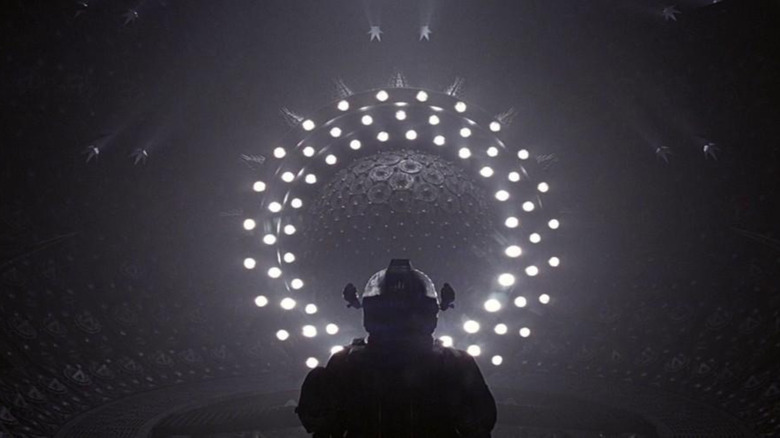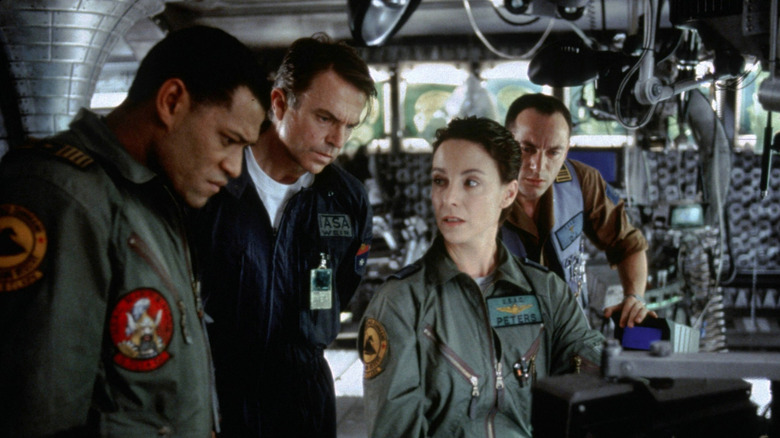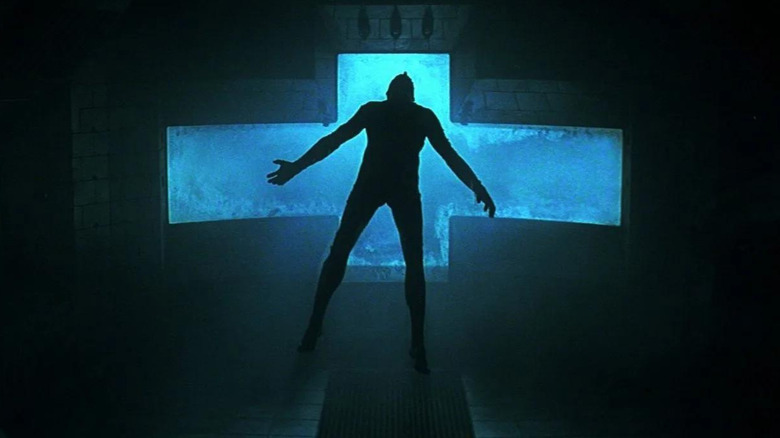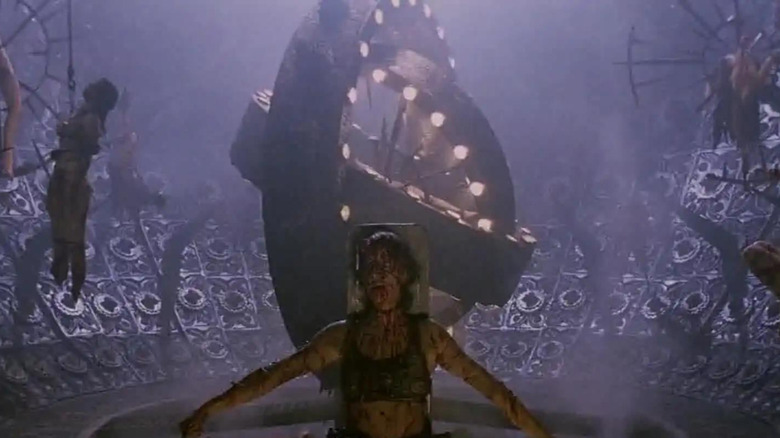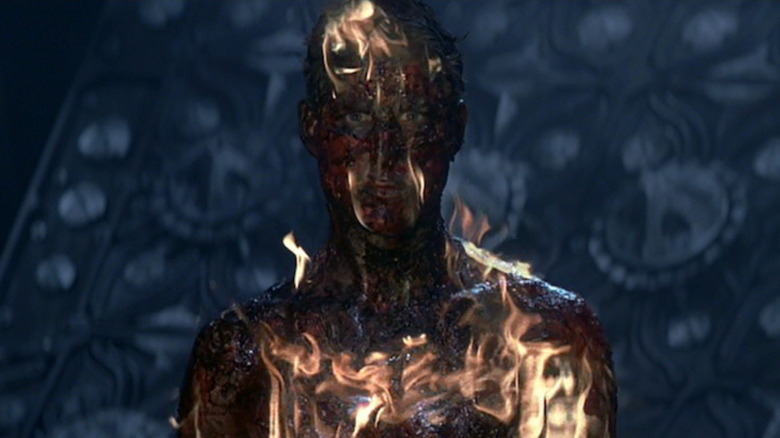Why Event Horizon Is One Of The Best (And Scariest) Sci-Fi Horror Movies Ever Made
Space horror is a weird subgenre to pull off effectively. Sure, many might think that it's easy to just place a typical horror movie, conventions and all, into a space setting — but it's a lot more complex than that. If you are going to make a horror movie set in space, you are going to have to embrace the nothingness and existentialism that the setting offers; after all, as "Alien" first said back in 1979, in space, no one can hear you scream.
However, if we are to look at the subgenre on a critical level, there might not be a movie that pulls off its trademarks more uniquely than Paul W.S. Anderson's 1997 film, "Event Horizon." While not a direct Lovecraft adaptation, it is arguably the best example of the terror of the incomprehensible and bizarre, using the vastness of space as its backdrop. At the same time, though, it is apparent that the movie audiences received was not the one Anderson had in mind; it was a film that had its ideas reduced to mere concepts instead of concrete fear.
This is the ultimate legacy that "Event Horizon" carries; an ambitious, thought-provoking tale about the horrors of the mind that was recut so much, that only a small portion of its grander story made it to the screen. However, even in this incomplete state, it is a movie that has few contemporaries in terms of scope and story, making it a truly unique experience to watch even 25 years after its initial release.
Have you ever seen fire in zero gravity?
Before we go any further, it is important to note that the Directors Guild of America, the Hollywood union for directors, mandates for the completed director's cut of a movie to be fully edited within ten weeks of completing principal photography. According to the "Directors' Minimum Conditions" article of the Guild's mandates, this cut of the movie is meant "for presentation to the individual Producer and to the person designated in the Director's deal memo as having final cutting authority [...] over the motion picture." When on a normally-scheduled project, ten weeks is perhaps plenty of time to assemble the best possible version of a movie.
However, "Event Horizon" was not a normally-scheduled project. Due to the highly-publicized delay of James Cameron's historical epic "Titanic," rushed photography and pressure from Paramount resulted in Anderson's cut being made in only one month (via The Ringer). That still wasn't enough, though, as the original 130-minute cut got slashed to 96 minutes after receiving poor test screening results. That's a ton of footage thrown out, and the hectic schedule to get the movie into theaters meant that the unused footage wasn't kept in ideal conditions. When Shout Factory announced their Blu-ray release of the film back in 2021, the company said on its Facebook page that most of this unused footage was now lost forever.
This place is a tomb
So, what was kept in the theatrical release? In the year 2047, the crew of the Lewis and Clark spacecraft receives a strange distress signal from the Event Horizon, a ship that seemingly disappeared seven years prior. The crew, headed by the skeptical and level-headed Captain Miller (Laurence Fishburne), are then tasked to recover any survivors or evidence as to what caused the ship to seemingly disappear. Initially, it's a plot not unlike other space horrors that came before it; a strange transmission being received by a ragtag crew, who then go investigate it.
However, the Event Horizon is no ordinary ship. According to the ship's mysterious engineer, Dr. Weir (Sam Neill), it actually has the ability to create a wormhole in order to move from place to place. As Lieutenant Starck (Joely Richardson) says, it should be impossible, but Weir was somehow able to pull it off.
This herein lies one of the film's most prevailing themes: some aspects of the universe are not to be questioned nor changed, as attempting to do so could result in unimaginable consequences. By being able to travel through an impenetrable entity like the space-time continuum, the Event Horizon was able to unleash something incomprehensible to the human mind. That evil now haunts the abandoned spaceship. It infiltrates the minds of the Lewis and Clark crew and causes them to experience visions of their most traumatic moments until they eventually succumb to the madness.
Hell is only a word
Admittedly, you don't get to know much about these characters. They are actually fairly one-dimensional in terms of characterization, resembling archetypes more than real people. The storyline of med tech Peters (Kathleen Quinlan) revolves solely around being what she considers a bad mother, while rescue tech Cooper (Richard T. Jones) is saddled with some pretty cringey and dated dialogue. On this front, the writing certainly could be better.
Despite this, it's hard not to feel horrible for these characters, late '90s writing and all, as it's clear that dying at the hands of the ship's evil is a fate that shouldn't be wished upon anyone. The few scenes that were preserved of the team's crew restrained and screaming in the fires of eternity are haunting, especially given the way they are frantically cut together. They are essentially condemned to an eternity of suffering.
Or maybe it's an eternity of awakening? At least, that's what Weir believes. Instead of sadness, the architect has dove headfirst into madness, becoming the human vessel of the evil haunting the ship. Unfortunately, it's fitting — after all, why wouldn't the creator be the one who arguably receives the most gruesome fate?
It is this evil, this promise of eternal damnation in a place that can only be described as hellish that makes "Event Horizon" remain an important part of the sci-fi genre. While many movies have attempted to dabble in more abstract ideas, few have been able to condense them in such an accessible but still haunting way.
Where do we go from here?
Can there ever be a movie like "Event Horizon" in today's landscape, despite its full vision never being able to materialize? Maybe, but that suggests that mainstream Hollywood movies are interested in exploring these ideas right now. Even though the movie we received was only around half of its deeper story, it is arguably still far richer in ideas and themes than the blockbusters of today. The only movies that have come just a tiny bit close to exploring the same ideas are more independently-funded movies, such as "High Life," but even then, the two aren't exactly comparable.
"Event Horizon" was the right movie that came out at the wrong time. While the themes of existentialist dread and the meddling of the unthinkable likely resonated with some audiences back in 1997, they are now more poignant than ever, yet not being taken advantage of in mainstream Hollywood. We are living in a time where centuries-old diseases are returning and former presidents are being investigated by the FBI. It's hard not to feel like we're living in a purgatorial state of suffering.
It is not a perfect movie by any means, but it is a shame that we will never be able to see Anderson's true vision of the movie. Perhaps it could have fleshed out the more one-note characters or established its core evil forces a bit more. However, even in this incomplete state, "Event Horizon" is still effective in creating a space horror that can't be easily described or placed into one category of thought. There really is nothing like it being made today, despite its retrospective cult reverence, and maybe there will never be anything like it ever again. Liberate tutemet ex inferis.
